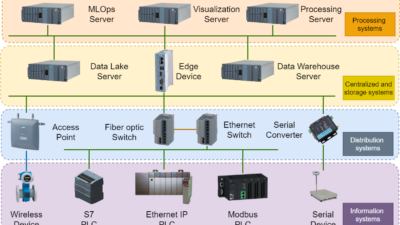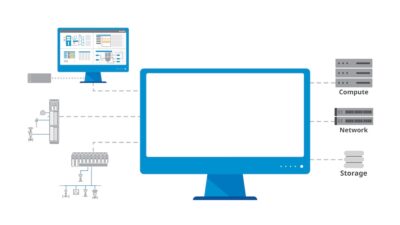Buying a once-struggling tech-services company for nearly $14 billion may be Mark Hurd's biggest gamble since taking the helm at Hewlett-Packard in 2005. It's definitely HP's biggest acquisition since Hurd's predecessor, Carly Fiorina, acquired Compaq for $19 billion in 2002.
Buying a once-struggling tech-services company for nearly $14 billion may be Mark Hurd’s biggest gamble since taking the helm at Hewlett-Packard in 2005, but he sounded supremely confident Tuesday.
“We think this thing has got tremendous opportunities,” Hurd told Wall Street analysts. Buying Electronic Data Systems will make HP a “leading force” in a market now dominated by IBM, he said. “We have got work to do, but we feel like we can have a pretty damn attractive business here.”
HP’s stock price dropped again for the second day since word of the acquisition surfaced, as some analysts questioned whether HP is paying too much or whether EDS’s slower growth will weigh HP down.
But others noted Hurd’s success in turning around his own company—overcoming controversy over an earlier acquisition, while cutting costs and improving efficiency as HP surpassed its competitors to become the world’s biggest seller of personal computers.
Stock analyst Brent Bracelin of Pacific Crest Securities summed up the reaction: “Three years from now, we may be able to look back and say, ‘What a great move Hurd made.’ But six months from now, we may look back and say, ‘Ugh, why did he do that?'”
What Hurd is doing is seeking growth outside the company’s traditional domain of business and consumer hardware, by buying the world’s second-largest provider of business technology services. EDS provides advice to commercial and government clients, designs their computer systems or other back-office functions, and even operates those systems on contract.
HP has been trying to sell more consulting and technical services in recent years. Now, if Hurd can overcome the business and cultural challenges of integrating the Texas-based EDS into HP’s Palo Alto, Calif.-based universe, industry experts say HP could become a major competitor in an extremely lucrative arena.
“Hurd has been the integrator par excellence,” said analyst Peter Bendor-Samuel, referring to HP’s successful assimilation of PC-maker Compaq.
Acquiring EDS is “probably the only way” for HP to move into second place in the fast-growing business-services market, added Bendor-Samuel, CEO of a technology-outsourcing research firm called Everest Group .
The deal, which has been approved by the boards of both HP and EDS, would more than double HP’s current services business, Hurd told reporters Tuesday. He said the two companies had combined revenues of more than $38 billion from selling technology and consulting services to business and government clients last year.
By comparison, Gartner, the Stamford, Conn.-based research firm estimates IBM had $54 billion.
EDS chief executive Ron Rittenmeyer will continue to run the operation as a division of HP, reporting to Hurd. Rittenmeyer has been credited with cutting costs and streamlining operations after EDS struggled with losses in the early part of this decade.
During an early morning conference call Tuesday, both men indicated HP expects to cut costs further at EDS, by eliminating duplication, trimming staff, and automating some functions. They declined to be specific.
While EDS’s business has been growing more slowly than HP’s overall operations, Hurd said, “We wouldn’t do the deal if we didn’t think we had an opportunity to improve the operating profit levels that EDS currently has.”
HP said it will pay $25 per share for EDS stock, which jumped from under $20 on Monday to $24.34 on Tuesday. After figuring in stock options, restricted stock and assumed debt, HP said the deal is worth $13.9 billion—making it HP’s biggest acquisition since Hurd’s predecessor, Carly Fiorina, acquired Compaq for $19 billion in 2002.
Separately, HP issued a preliminary earnings report Tuesday that projected its 2008 revenue overall will be $114.2 billion to $114.4 billion, up from its previous estimate of $113.5 billion to $114 billion, with earnings per share of $3.30 to $3.34—up from an estimate of $3.26 to $3.30.
HP postponed its official quarterly earnings report, scheduled for this week, to Tuesday.
While some investment analysts questioned the deal, others concluded that HP’s overall size and strength would allow it to digest EDS without a major hiccup.
“The EDS acquisition was unexpected but strategically and financially compelling,” Citigroup’s Richard Gardner wrote in a note to investors. While HP’s stock price dropped in response to the deal, he called that “a clear over-reaction.”
Experts in technology outsourcing, meanwhile, said the deal will give HP more opportunities to supply EDS clients with hardware and software, as well as consulting services. But they said the combined companies would still fall short of IBM in a few areas.
IBM, which bought the consulting arm of PricewaterhouseCoopers in 2002, does far more “high-end” management consulting than EDS, said Patrick Sayers, who tracks business services for the 451 Group research firm. EDS is more likely to operate IT systems and other business functions, which have lower profit margins.
And while EDS has been replacing some of its U.S. workforce with employees in India, Ben Pring of the research firm Gartner said IBM has a larger presence in that country. Staffing costs are generally lower in India, compared to the United States, and Indian firms have begun competing for U.S. contracts.
“There is a lot of work to be done at EDS,” said Wall Street analyst Shannon Cross of Cross Research. But she added: “That tends to be Mark Hurd’s modus operandi: fixing businesses.”
Buying EDS doesn’t mean Hurd has run out of ways to squeeze more efficiency or increase revenues in the PC and printer businesses, HP executive vice president Shane Robison told the San Jose Mercury News. Cross said she agreed.
“But it makes me feel more confident that Hurd believes HP is on the right path,” she said, “so he can afford to go out and buy a fixer-upper to concentrate on.”



